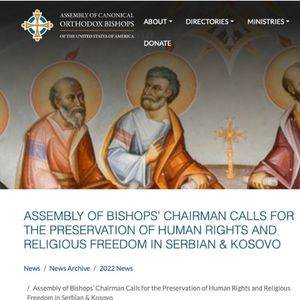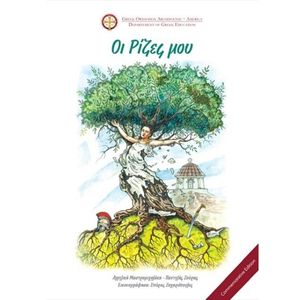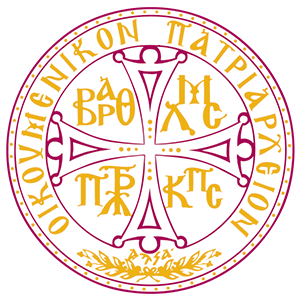February 2023 College & Young Adult Conference
.

Alternating Sundays:
9 AM Orthros Prayer Service &
10 AM Divine Liturgy Communion Service
—
10 AM Typica Service
—
The 10 AM Sunday services are followed by Coffee Hour and Fellowship.
HOUSE BLESSINGS
Fr. Nektarios can visit your home to give house blessings this month. If you are interested in receiving this traditional, yearly blessing on your home, please call Fr. Nektarios at (325) 642-1340 or email him.
~
VASILOPITA AUCTION
Thank you to everyone who participated in last week's auction of Vasilopita (St. Basil Bread) to raise money for St. Basil Academy. The breads were beautiful, and the donors were generous. Thank you all!
St. Basil Academy is a national not-for-profit philanthropic center for orphaned children and young adults in need. Their mission is to provide a safe and supportive environment where children and young adults are nurtured to become healthy members of society with vision and hope. Please join us in supporting this worthy organization.
~
UPCOMING SERVICES
~
ONLINE CATECHISM CLASS
Join us for every Thursday for our weekly catechism class, online via Zoom. Your host is Fr. Nektarios Morrow.
All are welcome. Whether you are an experienced Orthodox, a serious enquirer, or a complete newbie, feel free to join us for discussion and learning.
Our next class will be on Thursday, January 12, at 7:00 pm.
This week's topic — The Conversion of the Slavs — Background reading: The Orthodox Church by Timothy Ware, Chapter 4.
Previous classes are archived on YouTube at https://www.youtube.com/channel/UC7ronGHeNPzEgi9mDcF0Y2A/streams
Zoom link: https://us02web.zoom.us/j/9299265692?pwd=cytWQUQ2Z1JrdnZ5czliMTR2dktoQT09
Meeting ID: 929 926 5692
Passcode: Grace22
Questions? Email Fr. Nektarios
~
Orthodox Homeschool Mom's Luncheon
Saturday, January 28, 2023 11:00 am - 2:00 pm
Registration:
Location:
St. John the Baptist Greek Orthodox Church
(held in the Parish Center/Church Hall)
303 Cullum Drive
Euless, TX 76040
Ticket Cost:
More Information: https://onrealm.org/stjohndfw/PublicRegistrations/Event?linkString=NjI1YWQ0MjktZTIzYi00ZTkxLTg1OTEtYWY1YjAxMjE2YmIx
~
FASTING
Question: Why do we fast?
Answer: Because Christ did. He also said that we need to fast to increase our spiritual strength. “This kind can come out by nothing but prayer and fasting.” (Mark 9:29)
Answer: Because Christ was betrayed on a Wednesday, and crucified on a Friday.
~
CARING MEALS MINISTRY
If you know someone who needs meals due to illness, birth, etc., please see Kathy Baughman or Noelle Bartl. Thank you to everyone who volunteers for this ministry. You are being the hands of Christ!
~
BAKE SALE FUNDRAISER FOR CHURCH
We are still accepting orders for Greek Pastries. All proceeds go to supprt the operating costs of our parish. Please contact Wilma Dunias, a member of our parish, at baklavabywilma@live.com or 720-989-7928.
~
HELP FOR THE GARCIA FAMILY
~
PARISH COUNCIL
The next meeting will be in January, during Coffee Hour.
~
COFFEE HOUR
We have open slots on the sign up sheet for Coffee Hour, which can be found on the refrigerator in the church kitchen. Can you help host? It's okay to bring something simple, or even just one dish. Encourage others to sign up with you as co-hosts. "Many hands make the burden light." Thank you for your help!
~
Check out the rest of the bulletin online! See below for news from the world of Orthodoxy, online concerts and lecture series, and more.
~
SPECIAL OCCASIONS FOR JANUARY
Birthdays: Joanna Garcia, Marika Harris, Amy McDaniel
Anniversaries: Fr. Mark Lichtenstein, Ordination to the Diaconate on St. Anthony’s Day
Namedays:
1/1 Tim Beys (St. Telemachos the Martyr)
1/2 Dustin Clopton (St. Seraphim of Sarov)
1/7 John Choate, Joanna Garcia, Joanna Kalaitzes, John Pete Kouvelis, John Lichtenstein, Heidi Papachristos, Joanna Weir, John Wimberley (all named after St. John the Baptist)
1/13 Hilary Choate (St. Hilary of Poitiers)
1/17 Anthony Bartl (St. Anthony)
Memorials: none
~
AFTER CHURCH
Please join us for refreshments in the Social Hall.
** As always, see the parish website for any changes and updates. **
JOYFUL FASTING
When you hear that Lent is coming, do you close your eyes and groan? What if I said there is a secret to not starving when you fast — would that help you fast more cheerfully?
Well, there is. Fasting is about more than just food, of course, but let's face it: It's hard to do those other things when we are low on energy due to not getting good nutrition.
So here it is: The secret to fasting without starving is eating complementary protiens, such as beans + rice.
Proteins are made of amino acids. Meats, seafood, and dairy have all the amino acids our bodies need, so they are called "complete proteins."
Most fasting foods, however, rely on "partial proteins." In a beans-and-rice dish, for example, beans have some of the amino acids our bodies need daily...and rice has the others. They are complementary to each other, meaning that they complete each other by being together.
When we pair partial proteins together, we can create a "complete protein." Instead of feeling like we are starving during Lent, we can feel light and satisfied. We just need to know there are two categories of partial proteins, and we need one from each category to create a complete, satisfying protein.
Category 1: Beans*, seeds, peas, nuts**
Category 2: Rice, potatoes, corn, grains, bread, pasta, tortillas
*See below for tips on how to avoid gassiness from beans.
**It is not recommended to bring nut dishes to public events.
Did you know that fasting foods are supposed to be simple to prepare? This is so we can have more time to spend on praying, reading our Bibles, going to weekday services, studying about saints and Church history, giving alms, and doing good deeds for others, as caring Christ-followers should.
These physical actions of devotion, alms-giving, and doing good deeds are part of fasting. Why? Because we are fasting from some of our worldly activities (such as more-elaborate meal preparation) and devoting our time and attention to Christ.
It's not that elaborate meal preparation is unholy — not at all! Fancier cooking is simply an activity we give up on Wednesdays and Fridays, and all during Lent, so we can devote more of our time and energy to Christ.
Even so, fasting food can be tasty! Here are two examples:
Tips:
Worried about gas from beans? Watch this video about proper preparation of beans to make them more digestible.
If you prefer canned beans, we recommend using Eden Organic canned beans. They are prepared with overnight soaking to avoid gassiness.
Actually, soaking is good to do for more than just beans: Soaking any partial protien before cooking improves its digestibility. In other words, soaking before cooking makes it easier for your body to break down the food, and lets you absorb more nutrients from it. For more on this, see the article, "Living with Phytic Acid."
~
COOKBOOK RECOMMENDATION
Looking for a fasting cookbook that deals with modern diets like paleo, gluten-free, and nut-free? That isn't ethnic?
Article on "Joyful Fasting" © 2022 Presvytera Suzanne Thorpe Lichtenstein, used by permission
.
 Find insights about the Apolytikion of the Feast of Epiphany. What does Theophany or Epiphany actually mean? Is the Holy Spirit really a dove? And how is the Holy Trinity manifested on the day of Theophany?
Find insights about the Apolytikion of the Feast of Epiphany. What does Theophany or Epiphany actually mean? Is the Holy Spirit really a dove? And how is the Holy Trinity manifested on the day of Theophany?
 On January 4, 2023, His Eminence Archbishop Elpidophoros of America presented a donation of more than $370,000 to the Ecumenical Patriarchate of Constantinople for the restoration of the Balikli Hospital and Nursing Home, which was devastated by a fire in August 2022.
On January 4, 2023, His Eminence Archbishop Elpidophoros of America presented a donation of more than $370,000 to the Ecumenical Patriarchate of Constantinople for the restoration of the Balikli Hospital and Nursing Home, which was devastated by a fire in August 2022.
 Find insights about the Apolytikion of the Forefeast of Epiphany. How can a river turn back? Did the Jordan River turn back during the Baptism of Christ? Also, where does the name Jordan River come from?
Find insights about the Apolytikion of the Forefeast of Epiphany. How can a river turn back? Did the Jordan River turn back during the Baptism of Christ? Also, where does the name Jordan River come from?
 Find insights about a hymn from today’s Matins Service of the Forefeast of the Epiphany. What does Christ do for our salvation? And how does Christ enable us to realize our highest destiny? Also, how can we meet Christ in the Church?
Find insights about a hymn from today’s Matins Service of the Forefeast of the Epiphany. What does Christ do for our salvation? And how does Christ enable us to realize our highest destiny? Also, how can we meet Christ in the Church?
 Find insights about a hymn called the Apolytikion of the Forefeast of Epiphany. What does Christ’s baptism have to do with Adam and Eve? And why were they all of a sudden naked in Paradise? Also, how can we put on Christ?
Find insights about a hymn called the Apolytikion of the Forefeast of Epiphany. What does Christ’s baptism have to do with Adam and Eve? And why were they all of a sudden naked in Paradise? Also, how can we put on Christ?
 Find insights about a hymn from the Matins Service on January 2nd. How many prophecies in the Old Testament are fulfilled on the Feast of the Theophany? What comes first, worship or doctrine and discipline? Also, how can we prepare ourselves to celebrate this great Feast? To find out, read this mini-sermon from the Department of Religious Education (DRE): www.goarch.org/departments/religioused/sermons
Find insights about a hymn from the Matins Service on January 2nd. How many prophecies in the Old Testament are fulfilled on the Feast of the Theophany? What comes first, worship or doctrine and discipline? Also, how can we prepare ourselves to celebrate this great Feast? To find out, read this mini-sermon from the Department of Religious Education (DRE): www.goarch.org/departments/religioused/sermons
 Find insights about a hymn from the January 1st service called the apolytikion (in Greek: ἀπολυτίκιον). Circumcision was something that God Himself commanded Abraham to implement, but why? And circumcision in the Old Testament gives way to what Holy Sacrament today? To find out, read this mini-sermon from the Department of Religious Education (DRE): www.goarch.org/departments/religioused/sermons
Find insights about a hymn from the January 1st service called the apolytikion (in Greek: ἀπολυτίκιον). Circumcision was something that God Himself commanded Abraham to implement, but why? And circumcision in the Old Testament gives way to what Holy Sacrament today? To find out, read this mini-sermon from the Department of Religious Education (DRE): www.goarch.org/departments/religioused/sermons
 In light of the developing situation between Serbia and Kosovo, including the prevention of Patriarch Porfirije on December 26, 2022 by the authorities in Pristina to visit his historic and primatial see of Peć, His Eminence Archbishop Elpidophoros of America, in his capacity as Chairman of the Assembly of Bishops, conveyed an intervention to The Honorable Secretary of State Antony Blinken. In the letter, the chairman asks Secretary Blinken:
In light of the developing situation between Serbia and Kosovo, including the prevention of Patriarch Porfirije on December 26, 2022 by the authorities in Pristina to visit his historic and primatial see of Peć, His Eminence Archbishop Elpidophoros of America, in his capacity as Chairman of the Assembly of Bishops, conveyed an intervention to The Honorable Secretary of State Antony Blinken. In the letter, the chairman asks Secretary Blinken:
 In response to an overwhelming interest in the Summer 2023 camping ministry programs and in an effort to accommodate as many participants as possible, the Office of Ionian Village is updating its Summer 2023 dates.
In response to an overwhelming interest in the Summer 2023 camping ministry programs and in an effort to accommodate as many participants as possible, the Office of Ionian Village is updating its Summer 2023 dates.
 The Office of Greek Education, in cooperation with the High Council for Greek Education, is delighted to announce the publication of "H Rizes Mou." The book presents a glimpse into the Greek culture and its traditions. Educational and picturesque, this book teaches by example. Full color illustrations and informative text introduce Greek Orthodox holidays, traditions and cultural events that are observed.
The Office of Greek Education, in cooperation with the High Council for Greek Education, is delighted to announce the publication of "H Rizes Mou." The book presents a glimpse into the Greek culture and its traditions. Educational and picturesque, this book teaches by example. Full color illustrations and informative text introduce Greek Orthodox holidays, traditions and cultural events that are observed.
 The 11th Academic Consultation between Judaism and Orthodox Christianity took place December 4-6, 2022, in Vienna, Austria. The theme was “Jewish-Orthodox Christian Dialogue: Navigating Our Relations to the World and to Each Other.” The Consultation was co-sponsored by the Ecumenical Patriarchate and the International Jewish Committee for Interreligious Consultations (IJCIC).
The 11th Academic Consultation between Judaism and Orthodox Christianity took place December 4-6, 2022, in Vienna, Austria. The theme was “Jewish-Orthodox Christian Dialogue: Navigating Our Relations to the World and to Each Other.” The Consultation was co-sponsored by the Ecumenical Patriarchate and the International Jewish Committee for Interreligious Consultations (IJCIC).
 Most honorable brother hierarchs,
Beloved children in the Lord,
Today our Holy Church celebrates the Nativity in the flesh of the pre-eternal Son and Word of God, this “foreign and strange mystery” that “was concealed from ages and from generations” (Col. 1:26).
Most honorable brother hierarchs,
Beloved children in the Lord,
Today our Holy Church celebrates the Nativity in the flesh of the pre-eternal Son and Word of God, this “foreign and strange mystery” that “was concealed from ages and from generations” (Col. 1:26).
Eighth Orthros Gospel
The Reading is from John 20:11-18
At that time, Mary stood weeping outside the tomb, and as she wept she stooped to look into the tomb, and she saw two angels in white, sitting where the body of Jesus has lain, one at the head and one at the feet. They said to her, "Woman, why are you weeping?" She said to them, "Because they have taken away my Lord, and I do not know where they have laid Him." Saying this, she turned round and saw Jesus standing, but she did not know that it was Jesus. Jesus said to her, "Woman, why are you weeping? Whom do you seek?" Supposing Him to be the gardener, she said to Him, "Sir, if you have carried Him away, tell me where you have laid Him, and I will take Him away." Jesus said to her, "Mary." She turned and said to Him in Hebrew, "Rabboni," which means Teacher. Jesus said to her, "Do not touch Me, for I have not yet ascended to the Father; but go to My brethren and say to them, I am ascending to My Father and your Father, to My God and your God." Mary Magdalene went and said to the disciples, "I have seen the Lord," and she told them that He had said these things to her.
Prokeimenon. 1st Tone. Psalm 32.22,1.
Let your mercy, O Lord, be upon us.
Verse: Rejoice in the Lord, O ye righteous.
The reading is from St. Paul's Letter to the Ephesians 4:7-13.
BRETHREN, grace was given to each of us according to the measure of Christ's gift. Therefore it is said, "When he ascended on high he led a host of captives, and he gave gifts to men." (in saying, "He ascended," what does it mean but that he had also descended into the lower parts of the earth? He who descended is he who also ascended far above all the heavens, that he might fill all things.) And his gifts were that some should be apostles, some prophets, some evangelists, some pastors and teachers, to equip the saints for the work of ministry, for building up the body of Christ, until we all attain to the unity of the faith and of the knowledge of the Son of God, to mature manhood, to the measure of the stature of the fullness of Christ.
Sunday after Epiphany
The Reading is from Matthew 4:12-17
At that time, when Jesus heard that John had been arrested, he withdrew into Galilee; and leaving Nazareth he went and dwelt in Capernaum by the sea, in the territory of Zebulun and Naphtali, that what was spoken by the prophet Isaiah might be fulfilled: "The land of Zebulun and the land of Naphtali, toward the sea, across the Jordan, Galilee of the Gentiles, the people who sat in darkness have seen a great light, and for those who sat in the region and shadow of death light has dawned." From that time Jesus began to preach, saying, "Repent, for the kingdom of heaven is at hand."
In giving birth you remained a virgin.
And in your dormition, you did not forsake the world, O Theotokos.
For as the Mother of Life, you have yourself passed into life.
And by your prayers, you deliver our souls from death.
Saint George lived about the beginning of the ninth century in Palestine, in a certain monastery called Hozeva, which lies in a great ravine between Jerusalem and Jericho.
Saint Domnica was from Carthage. During the reign of the Emperor Theodosius the Great, she came with four other virgins to Constantinople, where she was baptized by Nectarius, the Patriarch of Constantinople. She remained in Constantinople and became known for her extreme asceticism, the miracles that she worked, and the grace of prophecy that adorned her. She lived until the days of the Emperors Leo and Zeno, reposing in peace about the year 474.
Saint Polyeuctus, a soldier in rank, contested during the reign of Valerian, in the year 255. He was from Melitene, a city in Armenia.
Our Father among the Saints Philip, Metropolitan of Moscow, was born in 1507 of noble family, and served for a time in the royal court. While still a young man, he secretly left Moscow and entered Solovki Monastery in the north, about the year 1538, a little over a hundred years after its founding. Because of his spiritual stature he was chosen against his will to succeed Abbot Alexis in 1548. As abbot, Philip was a great builder and beautifier of Solovki Monastery. He laid the foundations for the Cathedral of the Transfiguration, constructed cells, hermitages, and a hospital for the monks and for pilgrims, established a cattle yard on one of the islands, drained swamps and connected waterways by a series of canals and damns, built a mill and various workshops, and even invented ingenious machines and implements to help the monks in their work. His fame spread, and in 1566, by the will of Tsar Ivan IV, he was raised to the rank of Metropolitan of Moscow.
Tsar Ivan the Terrible revered Philip, even as Herod had revered Saint John the Baptist, and he had been a generous benefactor of Solovki Monastery. But because the Tsar had established the oprichnina, a state within a state, giving power to the oprichniki, who used it to oppress and rob the innocent, Philip told him the he could not be Metropolitan if the Tsar suffered the oprichniki to continue in power. This angered the Tsar, he told Philip that it was not for him to interfere in matters of state, and many hierarchs prevailed upon Philip to accept the Metropolitan's throne. But as the horrors committed by the oprichniki grew worse-thefts, false accusations, murders, and all manner of injustice and rapacity, with the knowledge of the Sovereign- Saint Philip could not remain silent. He rebuked the Tsar once and again for the reign of terror that he had brought upon his own people. The Tsar warned him to hold his peace and bless him to do as he wished. The Metropolitan answered that his silence brought sin upon the Sovereign. The Tsar threatened him with his wrath, and told him to resign his throne if he were not willing to comply. Saint Philip answered that he had not sought the Metropolitan's throne, and it was the Tsar who had deprived him of his hermitage on Solovki; but now the pastoral burden was upon him, he would not remain silent when the canons of the Church were broken.
The more the Tsar threatened Philip with his wrath, the more the holy hierarch stood fast and threatened the Tsar with judgment of God; Philip alone had the courage to rebuke the Tsar openly and oppose his iniquity. Finally the Tsar, finding false witnesses against Philip in his own monastery on Solovki, held a council against him in early November, 1568; the Saint had to endure the persecution of the Tsar who had torn him from his beloved monastery, the betrayal of his fellow hierarchs, and the slanders of his own spiritual children. He was imprisoned in Moscow, but because of the love of the people for him the Tsar feared him even in prison, and he was transferred to a monastery in Tver, where he spent a year in great hardships and continual prayer. On December 23, 1569, a royal messenger came, asking the Metropolitan's blessing for the Tsar's expedition to Novgorod. Saint Philip told him to do that which he came to do, then raised his hands in prayer to God. The Tsar's messenger fell upon him and suffocated the holy hierarch with a pillow. In 1591 his relics were transferred to Solovki, and in 1652 to the Dormition Cathedral in Moscow; many miracles were wrought through his holy relics (See also Oct. 5 and July 3).
Saint Gregory, the younger brother of Basil the Great, illustrious in speech and a zealot for the Orthodox Faith, was born in 331. His brother Basil was encouraged by their elder sister Macrina to prefer the service of God to a secular career (see July 19); Saint Gregory was moved in a similar way by his godly mother Emily, who, when Gregory was still a young man, implored him to attend a service in honor of the holy Forty Martyrs at her retreat at Annesi on the River Iris. Saint Gregory came at his mother's bidding, but being wearied with the journey, and feeling little zeal, he fell asleep during the service. The Forty Martyrs then appeared to him in a dream, threatening him and reproaching him for his slothfulness. After this he repented and became very diligent in the service of God.
Gregory became bishop in 372, and because of his Orthodoxy he was exiled in 374 by Valens, who was of one mind with the Arians. After the death of Valens in 378, Gregory was recalled to his throne by the Emperor Gratian. He attended the Local Council of Antioch, which sent him to visit the churches of Arabia and Palestine, which had been defiled and ravaged by Arianism. He attended the Second Ecumenical Council, which was assembled in Constantinople in 381. Having lived some sixty years and left behind many remarkable writings, he reposed about the year 395. The acts of the Seventh Ecumenical Council call him 'Father of Fathers."
This Saint had Cappadocia as his homeland. He lived during the years of Leo of Thrace, who reigned from 457 to 474. The Saint established in the Holy Land a great communal monastery, wherein he was the shepherd of many monks. While Saint Sabbas was the head of the hermits of Palestine, Saint Theodosius was governor of those living the cenobitic life, for which reason he is called the Cenobiarch. Together with Saint Sabbas, towards whom he cherished a deep brotherly love in Christ, he defended the whole land of Palestine from the heresy of the Monophysites, which was championed by the Emperor Anastasius and might very well have triumphed in the Holy Land without the opposition of these two great monastic fathers and their zealous defense of the Holy Council of Chalcedon. Having lived for 103 years, he reposed in peace.
Saint Tatiana was the daughter of a most distinguished consul of Rome. She became a deaconess of the Church, and for her confession of the Faith of Christ, she endured many torments. As she was suffering, angels punished her tormentors with the same torments they inflicted on her, until they cried out that they could no longer endure the scourges invisibly brought upon them. She was beheaded during the reign of Alexander Severus (111-135).
Saints Hermylus and Stratonicus contested for piety's sake during the reign of Licinius, in the year 314. Saint Hermylus was a deacon, and Stratonicus was his friend. For his confession of Christ, Hermylus was beaten so fiercely that his whole body was covered with wounds. Stratonicus, seeing him endure this and other torments that left him half dead, wept with grief for his friend. From this he was discovered to be a Christian, and when he had openly professed his Faith and had been beaten, he and Hermylus were cast into the Danube River, receiving the crown of martyrdom.
As for the holy Martyrs of Sinai and Raithu, those of Sinai contested during the reign of Diocletian, about the year 296; those of Raithu were slain about the middle of the fifth century. On both occasions, the perpetrators of these massacres were a barbarian tribe called Blemmyes, from the parts of Arabia and Egypt.
Because of the Apodosis of the Feast of Holy Theophany also on the 14th of January, the liturgical services to the Holy Fathers slain at Sinai and Raitho are transferred to January 13th.
The holy virgin Nina was from Cappadocia. According to some, her father Zabulon was a friend of the holy Great Martyr George, whose father was a Cappadocian. The conversion of Georgia by Saint Nina is reported in the Church histories of Rufinus, Socrates, Sozomen, and Theodoret: Rufinus, writing less than a hundred years after Saint Nina, said that he heard the history in Jerusalem from a Georgian Prince named Bacurius. Saint Nina was taken captive by the Georgians (whom the Greek accounts call Iberians), and while in captivity she lived a very devout life of sobriety and virtue, praying unceasingly night and day; this drew the attention of the Georgians, and to all who asked her about her way of life, she preached the dispensation of Christ. When she healed by her prayer a certain woman's sick child, whom no one else had been able to help, the report of her came to the ears of the Queen of Georgia, who was herself gravely afflicted with an incurable malady. She asked that the captive women be brought to her, but Saint Nina declined out of modesty, so the Queen commanded them to carry her to Nina. Saint Nina healed her immediately, and the Queen returned home in joy. When she extolled Nina and her faith to the king, he gave her no heed, although she mentioned it to him often. But while hunting in the forest, he was shrouded with an impenetrable darkness in which he lost his way, became separated from his men, and fell into despair; he made a vow that if Christ should deliver him, he would worship him alone. The light of day straightway shone again, and the king fulfilled his vow. He and the Queen were instructed in the Faith by Saint Nina, and they with the whole Georgian nation became Christ's. The King also sent an embassy to Saint Constantine the Great, informing him of their conversion, and requesting that priests be sent to Georgia. Saint Nina reposed in peace in about the year 335. The above-mentioned Church historians speak of her without calling her Nina. She is celebrated in the Roman Martyrology on December 15 under the name Christina.
Because of the Apodosis of the Feast of Holy Theophany also on the 14th of January, the liturgical services to Saint Nina are transferred to January 13th.
Saint Paul, first among hermits, was born about 227 in the Thebaid of Egypt. In 250 he fled into the wilderness because of the persecution raging at that time under Decius. Having lived a solitary life in a certain cave for ninety-one years, he reposed in 341, at the age of 114, and was buried by Anthony the Great, who had been directed thither by God several days before the Saint's repose.
Saint John, who was from Constantinople, was the son of illustrious parents -- Eutropius the Senator and Theodora. At twelve years of age he departed secretly from his home and went to the Monastery of the Unsleeping (see Dec. 29). Aflame with longing for his parents, he returned after six years to his father's home in the guise of a pauper and beggar. Living in a small hut at the gates of his parents' house (wherefrom he is called "hut-dweller"), he remained unknown therein for many years, and suffered mockery at the hands of those who had been his own servants. Foreknowing his death, he revealed himself to his parents, and within a few moments reposed, about the year 450.